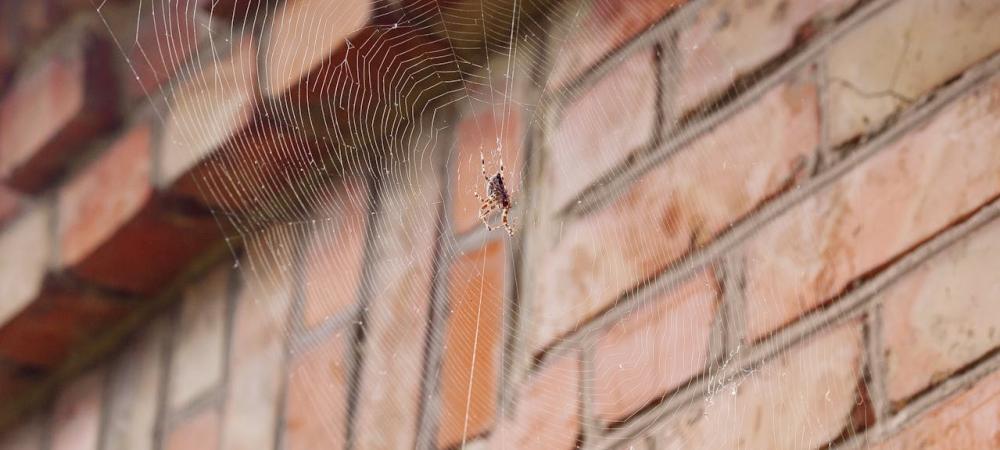Does Removing Spider Webs Get Rid of Spiders?

As a homeowner, you might have found yourself tangled in a web of confusion when dealing with spiders. One common question that often arises is whether destroying a spider’s web causes the spider to leave or even die. In this blog, we’ll delve into the relationship between spiders and their webs and what really happens when you remove spiderwebs.
Why Do Spiders Need Webs?
Before we dive into the consequences of destroying a spider's web, it's important to understand the purpose of these webs. Spiders spin webs for a variety of reasons:
- Catching Prey: Spiders generally use their webs to trap insects. The sticky threads ensnare unsuspecting prey, which the spider then consumes.
- Shelter and Protection: Some spiders use webs as a safe place to rest, lay eggs, or seek shelter from predators.
- Reproduction: Female spiders often create webs to lay their eggs in a secure environment where they can protect their offspring until they hatch.
Learn how to identify common house spiders.
What Happens When You Destroy a Spider's Web?
Contrary to popular belief, removing a spider’s web does not immediately get rid of the spider.
The Spider’s Response
If you destroy a spider’s web, the spider will generally try to rebuild it. Spiders are resilient creatures and will often start spinning a new web in the same location if it was an effective spot for catching prey or if the area provides good shelter. This rebuilding process can take several hours to a full day, depending on the spider species and the complexity of the web.
In some cases, particularly if the web was destroyed repeatedly or if the environment becomes unsuitable (due to excessive human activity or changes in the area), the spider may decide to relocate. Spiders prefer stable environments, so constant disruption might prompt them to find a new home.
The Spider’s Survival
Destroying a web does not usually harm the spider itself. Spiders are quite adept at surviving and adapting to changes. They will typically rebuild their web or relocate to a new area if needed. The destruction of the web does not directly impact the spider’s health or lifespan, though it may experience temporary stress from the disruption.
Web rebuilding requires energy, but it is a natural part of a spider's life cycle. It’s an ongoing process for many spider species, especially those that rely heavily on webs for catching food.
How To Get Rid of Spiders For Good
Getting rid of spiders in your house involves a multi-faceted approach beyond just removing their webs. Here are several effective strategies for controlling and eliminating spiders:
1. Reduce Food Sources
Spiders feed on insects, so reducing the presence of their prey can help make your home less attractive to spiders. Use insecticides, natural repellents, traps, and baits to manage insects like flies, ants, and mosquitoes that spiders feed on.
Regular cleaning is also essential—vacuum and clean your home frequently to remove crumbs and other food sources that might attract insects. Pay special attention to kitchen areas, where food spills are common. Also, consider keeping food sealed in air-tight containers and taking out the trash regularly to prevent pests.
2. Eliminate Hiding Spots
Spiders like to hide in dark and cluttered areas, so making your home less attractive to them involves reducing their hiding spots.
- Start by removing clutter from your home, especially in basements, attics, and garages, where spiders thrive in areas with minimal disturbance.
- Organize your storage areas by using sealed plastic containers rather than cardboard boxes to reduce the chances of spiders nesting.
- Dust and vacuum frequently to remove potential hiding spots and spider eggs. Pay special attention to corners, behind furniture, and other seldom-cleaned areas.
3. Seal Entry Points
Preventing spiders from entering your home is a proactive measure. Begin by inspecting your home:
- Check for Gaps: Inspect and seal any cracks, gaps, or holes in windows, doors, and foundations. This prevents spiders from entering your home.
- Install Weather Stripping: Ensure that weather stripping around exterior doors and windows is intact to close off potential entry points.
- Repair Screens: Ensure that window and door screens are intact and free of holes. This helps keep spiders and other pests outside.
4. Use Spider Repellents
There are several natural substances that spiders dislike, and that can help keep them away:
- Essential oils such as peppermint, eucalyptus, and tea tree oil are known to repel spiders. Mix a few drops of essential oil with water and spray it around entry points and areas where spiders are commonly seen.
- Vinegar is another effective natural repellent—a mixture of vinegar and water can also act as a natural spider repellent. Spray this solution around your home, focusing on areas where spiders are likely to enter.
- There are also commercial spider repellents available. Choose products specifically designed to repel spiders and follow the manufacturer's instructions for application.
5. Set Up Spider Traps
Using spider traps is an effective method for managing and monitoring spider populations within your home.
- Sticky traps are particularly useful—you can place them in areas where spiders are frequently seen, such as corners, basements, or under furniture. These traps capture spiders as they walk across them, providing a way to monitor their presence and gauge the extent of the infestation.
- Bait traps are another option—these traps are designed to attract spiders with a bait, which they then consume or carry back to their hiding spots. This can help reduce spider populations over time.
- Pheromone traps are also available. These traps use pheromones to attract and capture spiders. These can be effective for reducing spider populations.
By regularly checking and replacing these traps, you can keep a close watch on spider activity and ensure that your control measures are working effectively.
6. Maintain Outdoor Areas
Maintaining your outdoor areas can actually help prevent spiders from migrating into your home. Begin by ensuring that your yard and garden are well-kept:
- Regularly trim shrubs, bushes, and trees to prevent them from touching your home, as these can serve as pathways for spiders to enter.
- Remove any debris, such as piles of leaves or wood, which can provide ideal hiding spots for spiders and their prey.
- Keep outdoor lighting to a minimum or use yellow bulbs, which are less attractive to insects. Since spiders often follow insects into your home, reducing outdoor insect activity can help lower spider populations indoors.
Regular maintenance of your outdoor environment not only helps in keeping spiders at bay but also contributes to a more pleasant and manageable living space.
7. Professional Pest Control
If you have a significant spider infestation or if spiders are a persistent problem, it may be best to consult a professional pest control service such as Frontline Pest Control. Our team of local experts can provide a detailed home inspection, targeted treatments, and advice on preventing future infestations. Learn more about our comprehensive pest services in Maryland, Delaware, Virginia, West Virginia, and Tennessee.
FAQ About Spider Webs
Destroying a spider’s web does not generally lead to the spider’s death, but it may cause the spider to relocate or rebuild its web elsewhere. Spiders are resourceful and adaptable creatures, and they will continue to thrive as long as they find suitable conditions for their survival.
Why Are There Spider Webs in My House?
Spider webs in your home can be both unsettling and puzzling. Here are some common reasons why spiders choose to make their homes indoors:
- Shelter and Safety: Homes provide spiders with a safe and stable environment. Indoor spaces offer protection from predators, harsh weather, and other natural threats. Many spiders prefer the safety of indoor spaces, particularly if they can find a quiet, undisturbed area to spin their webs.
- Food Sources: Spiders are attracted to places where they can find food. Indoor environments often host a variety of insects, such as flies, mosquitoes, and moths, which serve as prey for spiders. If your home provides a steady food source, it can attract spiders to set up residence.
- Warmth: Spiders are cold-blooded creatures that thrive in warmer environments. Your home’s consistent indoor temperature can be inviting to spiders, especially during cooler months when outdoor temperatures drop.
- Clutter and Hiding Spots: Cluttered areas, such as basements, attics, and storage spaces, provide excellent hiding spots for spiders. Boxes, old furniture, and piles of clothes can create ideal environments for spiders to spin their webs and remain concealed.
- Entry Points: Spiders can enter your home through small cracks, gaps, and openings in windows, doors, and foundations. Once inside, they can find suitable areas to build their webs and establish their presence.
Do Spiders Die If You Destroy Their Web?
No, spiders do not typically die if you destroy their web. Destroying a web usually only affects the spider's current living arrangement. Most spiders will either rebuild their web in the same location or relocate to a new area. The destruction of the web does not directly harm the spider, though it may cause temporary stress. Spiders are resilient and adaptable creatures, and they will generally continue to survive as long as they can find food and shelter.
How Do You Remove A Spider Web?
To effectively remove a spider’s web and reduce the likelihood of spiders returning, follow these steps:
- Use a Vacuum Cleaner: A vacuum cleaner is one of the most efficient tools for removing spider webs. Use the hose attachment to reach corners, ceiling edges, and other areas where webs are commonly found. This method helps remove both the web and any potential spider eggs.
- Dust Cloth or Duster: If you prefer not to use a vacuum, a dust cloth or duster can be used to wipe away spider webs. Choose a duster with a long handle to reach high or hard-to-access areas. Gently sweep the web away to avoid scattering spider eggs or debris.
- Broom: For large webs or those in high places, a broom can be effective. Use a broom with a long handle to reach up to the web and sweep it away. Be careful not to damage surfaces or disturb other items in the process.
- Dispose of Web Remnants: After removing the web, dispose of the collected debris immediately to prevent any spiders from re-establishing themselves. If you use a vacuum, empty the bag or canister outside your home.
